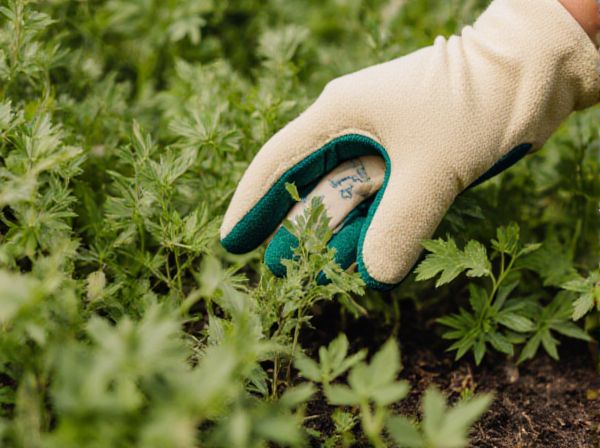
Natural weed suppression vs herbicide application Illustration
Natural weed suppression relies on ecological methods such as cover cropping, mulch application, and crop rotation to inhibit weed growth by improving soil health and creating competitive environments. Herbicide application offers rapid and targeted weed control but can negatively impact soil microbiota, contribute to chemical runoff, and potentially lead to herbicide-resistant weed species. Incorporating natural weed suppression techniques promotes sustainable agriculture by enhancing biodiversity and reducing chemical dependency.
Table of Comparison
| Feature | Natural Weed Suppression | Herbicide Application |
|---|---|---|
| Method | Using cover crops, mulching, crop rotation | Chemical spraying or soil treatment |
| Environmental Impact | Eco-friendly, promotes soil health | Potentially toxic, risk of contamination |
| Effectiveness | Gradual, long-term control | Rapid, targeted weed elimination |
| Soil Health | Improves organic matter and microbiota | May degrade soil quality over time |
| Cost | Low to moderate, sustainable over time | Variable, recurring chemical costs |
| Resistance Risk | Minimal resistance development | Weed resistance can develop quickly |
| Safety | Safe for humans, pets, and wildlife | Requires protective equipment, toxicity risk |
Understanding Natural Weed Suppression Methods
Natural weed suppression relies on ecological processes such as crop rotation, cover cropping, and mulching to inhibit weed growth by enhancing soil health and promoting beneficial microbial activity. These methods reduce weed seed germination through physical barriers and allelopathic effects, minimizing the need for chemical herbicides. Emphasizing soil biodiversity and plant competition creates a sustainable weed management system that supports long-term agricultural productivity.
The Science Behind Organic Weed Control
Natural weed suppression relies on ecological processes such as allelopathy, cover cropping, and mulching, which inhibit weed seed germination and growth without synthetic chemicals. Scientific studies show that organic methods enhance soil microbial diversity, improving plant resilience and nutrient uptake compared to herbicide application, which can damage beneficial organisms and promote herbicide-resistant weed species. Research in agroecology highlights that integrating crop rotation and organic amendments optimizes weed control while maintaining soil health and sustainability.
Herbicide Application: How It Works
Herbicide application involves the targeted use of chemical substances to inhibit or kill unwanted weed growth by disrupting critical biological processes such as photosynthesis or enzyme activity. This method provides rapid and effective control of diverse weed species, ensuring minimal competition for nutrients, water, and sunlight with desired crops. Precise application techniques, including spraying and soil incorporation, optimize herbicide efficacy while minimizing environmental impact and non-target plant damage.
Comparing Effectiveness: Natural vs. Chemical Weed Control
Natural weed suppression through methods such as mulching, cover cropping, and crop rotation enhances soil health and biodiversity, effectively reducing weed populations over time without harmful residues. In contrast, herbicide application provides rapid and targeted weed control but risks chemical resistance development and environmental contamination. Studies indicate that combining natural suppression with judicious herbicide use often achieves the best long-term weed management and sustainability outcomes.
Environmental Impact of Herbicides
Herbicide application often leads to soil degradation, water contamination, and loss of biodiversity, significantly impacting ecosystems. Natural weed suppression methods, such as cover cropping and mulching, enhance soil health and promote beneficial microorganisms without introducing toxic chemicals. Choosing organic weed control reduces environmental risks and supports sustainable agricultural practices.
Soil Health: Organic Practices vs. Chemical Treatments
Natural weed suppression through organic practices enhances soil health by promoting microbial diversity and improving soil structure, which increases nutrient availability and water retention. Herbicide application often disrupts these beneficial soil ecosystems, leading to reduced microbial activity and potential soil degradation over time. Organic methods like cover cropping and mulching support long-term soil fertility, contrasting with the short-term effects and environmental risks associated with chemical treatments.
Biodiversity Benefits of Natural Weed Suppression
Natural weed suppression fosters biodiversity by promoting a variety of plant species that support diverse insect and soil microbial populations, enhancing ecosystem resilience. Unlike herbicide application, which can diminish habitat complexity and reduce beneficial organisms, natural methods maintain ecological balance and nutrient cycling. This biodiversity boost contributes to healthier soil, improved pollination, and sustainable pest control in agricultural and natural systems.
Cost Analysis: Organic vs. Herbicide Approaches
Natural weed suppression methods such as cover cropping, mulching, and crop rotation reduce long-term costs by improving soil health and minimizing herbicide dependency, leading to sustainable weed management. Herbicide application offers lower upfront expenses but carries risks of resistance development, environmental contamination, and potential yield loss due to chemical stress. Organic practices demonstrate cost-effectiveness over time through enhanced biodiversity, reduced input demands, and improved ecosystem resilience.
Long-Term Sustainability in Weed Management
Natural weed suppression through cover crops and mulching enhances soil health and biodiversity, promoting long-term sustainability in weed management. Herbicide application often provides quick results but can lead to resistance and soil degradation over time. Sustainable strategies prioritize ecological balance, reducing reliance on chemicals and supporting resilient agricultural ecosystems.
Choosing the Right Weed Control for Your Organic Garden
Natural weed suppression in organic gardens relies on techniques such as mulching, crop rotation, and cover cropping to reduce weed growth without synthetic chemicals. Herbicide application, while effective in conventional gardening, can disrupt soil microbiomes and is typically avoided in organic practices to maintain ecological balance. Selecting the right weed control method involves assessing garden conditions, soil health, and the specific weed species present to promote sustainable growth and biodiversity.
Natural weed suppression vs herbicide application Infographic

 gardendif.com
gardendif.com